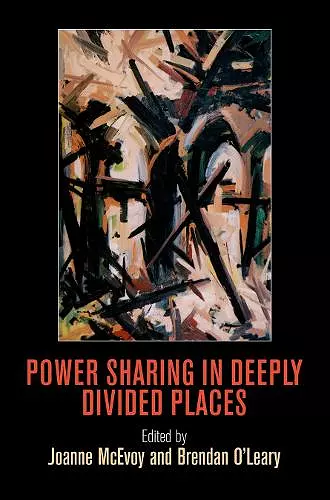Power Sharing in Deeply Divided Places
Brendan O'Leary editor Joanne McEvoy editor
Format:Hardback
Publisher:University of Pennsylvania Press
Published:30th May '13
Currently unavailable, and unfortunately no date known when it will be back

This volume considers an array of power-sharing systems in divided cities and states, with critical evaluations of their merits and defects as well as explanations of their emergence, maintenance, and failings.
Power sharing may be broadly defined as any set of arrangements that prevents one political agency or collective from monopolizing power, whether temporarily or permanently. Ideally, such measures promote inclusiveness or at least the coexistence of divergent cultures within a state. In places deeply divided by national, ethnic, linguistic, or religious conflict, power sharing is the standard prescription for reconciling antagonistic groups, particularly where genocide, expulsion, or coerced assimilation threaten the lives and rights of minority peoples. In recent history, the success record of this measure is mixed.
Power Sharing in Deeply Divided Places features fifteen analytical studies of power-sharing systems, past and present, as well as critical evaluations of the role of electoral systems and courts in their implementation. Interdisciplinary and international in formation and execution, the chapters encompass divided cities such as Belfast, Jerusalem, Kirkuk, and Sarajevo and divided places such as Belgium, Israel/Palestine, Northern Ireland, and South Africa, as well as the Holy Roman Empire, the Saffavid Empire, Aceh in Indonesia, and the European Union.
Equally suitable for specialists, teachers, and students, Power Sharing in Deeply Divided Places considers the merits and defects of an array of variant systems and provides explanations of their emergence, maintenance, and failings; some essays offer lucid proposals targeted at particular places. While this volume does not presume that power sharing is a panacea for social reconciliation, it does suggest how it can help foster peace and democracy in conflict-torn countries.
Contributors: Liam Anderson, Florian Bieber, Scott A. Bollens, Benjamin Braude, Ed Cairns, Randall Collins, Kris Deschouwer, Bernard Grofman, Colin Irwin, Samuel Issacharoff, Allison McCulloch, Joanne McEvoy, Brendan O'Leary, Philippe van Parijs, Alfred Stepan, Ronald Wintrobe.
"A properly edited collection can set an agenda or raise debate to a new level. This book does both: it provides greater clarification of the key terms, and analysis is extended massively through sections dealing with electoral systems, historical cases, and an imaginative set of issues that confront contemporary power-sharing arrangements. Crucially, a powerful introduction is matched by a brilliant synthetic conclusion. Here we have the state of the art of this vital subject in a single volume." * John Hall, James McGill Professor of Comparative Historical Sociology at McGill University *
"A cutting-edge collection of essays from some of the globe's leading authorities on consociational power-sharing, and from some of its emerging stars." * John McGarry, Canada Research Chair in Nationalism and Democracy at Queen's University, Fellow of the Royal Society of Canada *
"A brilliant and highly readable volume presenting the state of the art on power-sharing-both the latest theoretical developments and updates on practical applications-strongly recommended!" * Arend Lijphart, Research Professor Emeritus of Political Science at University of California, San Diego *
"An original, timely, and substantial contribution to the increasingly important field of study on consociational arrangements." * Christopher McCrudden, University of Michigan Law School *
ISBN: 9780812245011
Dimensions: unknown
Weight: unknown
448 pages